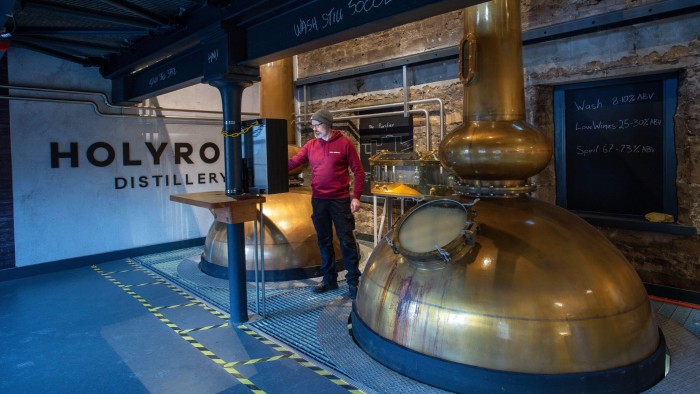Even before US President Donald Trump threw global trade into turmoil with his tariffs on imports, Huw Wright of Holyrood distillery was navigating multiple challenges to his young business.
Founded in 2019 in Edinburgh’s old town, the distillery has found it tough to place its younger whisky products on the shelves of major retailers, who prefer traditional brands with 10 or more years of maturation.
Consumers have been choosing cheaper products, input costs such as utilities and barley have soared, and a global glut of whisky stocked in warehouses has forced cash-strapped distillers to limit production.
“The spirits industry has had a horrid, tough time,” said Wright. “Buyers’ confidence in taking in new stock is so low.”
Trump’s trade war has compounded the woes facing Scotland’s 150-plus malt whisky sellers, triggering a wave of financing activity, from equity raises to outright sales, in a sector that accounts for about one-quarter of Scotland’s goods exports.
“Distilleries are trying to raise debt, equity or refinance — anything to shore up balance sheets,” said one industry executive. “But markets are really tough.”
In 2024, the value of Scotch whisky exports fell 3.7 per cent from 2023 to £5.4bn, while the volume increased by 3.9 per cent to 1.4bn bottles, according to the Scotch Whisky Association. Whisky contributed £5.3bn, or 3 per cent, to the Scottish economy in 2022, according the trade body’s latest impact report.
America’s 10 per cent tariff regime on UK goods, while not as severe as many expected, has layered more uncertainty on an industry facing its third cyclical downturn since the 1980s.
Levies of 25 per cent on single malt introduced for 18 months from 2019 during the first Trump presidency cost the industry £600mn, according to the SWA.
“The current US tariff issue has significantly amplified levels of uncertainty and challenge,” said Gregor Mathieson, director of spirits at Ferovinum, a fintech funding platform. “Confidence is dented, with companies pulling back.”
Big global players, such as FTSE 100-listed Diageo and Paris-based Pernod Ricard, control 60 per cent of the whisky market and have strong balance sheets to ease the pain.
Industry insiders said majors had been shifting stock to the US ahead of the tariff announcement. In February, Diageo said it “was taking a number of actions to mitigate the impact and disruption to our business that tariffs may cause”. The company declined to comment further on the measures.
Wright said Holyrood distillery would continue to sell to the US via ecommerce channels but was diverting all-important marketing budgets into “less risky” Europe.
“We don’t have much of a presence in the US, so we will still be in growth mode — it’s just more of an uphill battle,” he said.
Other distilleries are also reconsidering expansion plans. The family-owned Isle of Raasay distillery off Skye had been about to deploy marketing staff in the US, which accounts for roughly 5 per cent of sales, when Trump made his announcement.

Managing director William Dobbie said tariffs were “a definite concern — expansion is going to become more expensive and might put the plan at risk”, adding that he was looking to keep shelf prices unchanged by sharing the higher costs with his importer.
The family had been offered — and rejected — several potential acquisitions, Dobbie said, including a handful of “distressed opportunities” among newer distilleries that have mismanaged cash flows and failed to achieve sales.
Duncan McFadzean, chief executive of investment bank Noble & Co, which is working on several mergers and acquisitions transactions, said: “Several distilleries are actively looking for a buyer and a number are considering a sales process, who would probably consider an offer at a decent price.”
Although Irish whiskey is a different segment, Waterford’s high-profile failure last year has sharpened minds among Scotch producers — especially the smaller, craft operations among Scotland’s distilleries, about one-quarter of which were founded over the past couple of decades.
Lindores Abbey distillery, set up in 2017, has been trying to find a buyer for its majority Russian shareholders since the Scottish government called for an end business ties with Russia following President Vladimir Putin’s full-scale invasion of Ukraine in February 2022.

The arduous process was nearing completion, said director Helen McKenzie Smith, who has had to operate without debt facilities as the Fife distillery was shunned by banks and government promotion efforts because of its backers.
Bonnington distillery in Leith, north Edinburgh, had been up for sale, but owner Halewood Spirits said it had taken the business off the market a few months ago because of “market conditions”.
Andrew Ley, a partner at law firm Addleshaw Goddard who is working on two sales processes, warned that many distilleries had already had to pull funding levers, such as bank debt or loans using maturing whisky as collateral, to survive the pandemic.
“They won’t have the same resilience and reserves now,” he said. “Where there are good facilities with product maturing, that’s an attractive opportunity.”
Many of the potential buyers were coming from overseas, said Gareth Roberts, who consults on whisky projects. “The UK is up for sale — they see it as a distressed economy and the prestige parts will be snapped up quickest,” he said.
For Holyrood distillery, which has been speaking to potential US investors as it seeks to raise £2mn in equity, Wright said the tariffs had added “further uncertainty” to difficulties that were already there.
“It wasn’t as if it was easy last week [before the tariffs’ announcement],” he said. “So for us it won’t be that much harder now.”
Source link










